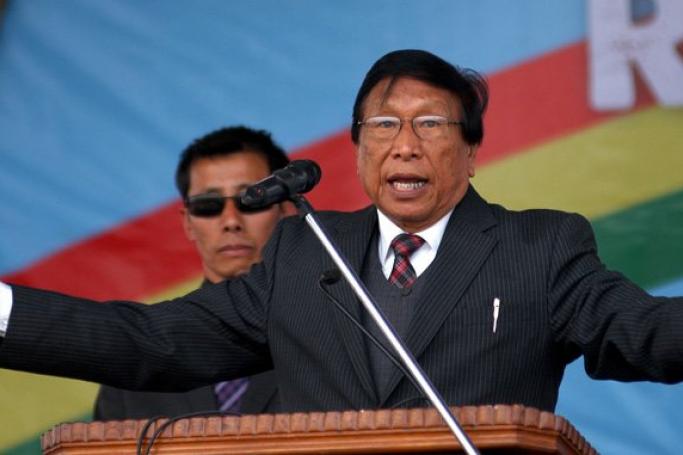Indian Prime Minister Narendra Modi claims his government has signed on Monday a 'historic accord' to end the six decade long insurrection by the Nagas in the country's troubled northeast.
But neither the government nor the Naga rebel leaders have disclosed the details of the agreement so far.
The general secretary of the National Socialist Council of Nagaland (NSCN), Thuingaleng Muivah has thanked the prime minister for 'understanding the problems faced by the Nagas'.
Modi, on his part, has said the Naga problem festered so long because India and the Nagas failed to 'understand each other'.
But the agreement has been signed with the dominant faction of the NSCN -- not with all the separatist factions.
Muivah's rival Myanmar Naga leader S S Khaplang actually reneged on the ceasefire with India in March this year.
His fighters have been attacking Indian security forces ever since.
At least 30 Indian soldiers and para-military troops have been killed in these attacks -- 18 in one strike in Manipur's Chandel district in June.
Khaplang, who has an alliance with several other northeast Indian rebel groups, has opposed the accord as a 'sell-out' and said he will not compromise with the 'Naga desire for independence'.
“So it is certain that Khaplang's fighters will step up their attacks to torpedo the accord,” Naga journalist Bano Haralu said.
“This is the risk the government has to take when it signed a deal with one rebel faction.”
Haralu points to the success of the 1986 accord that brought an end to a similar insurgency in the northeastern state of Mizoram.
“The 1986 accord signed by late Prime Minister Rajiv Gandhi's government was signed with the entire rebel leadership, not with a faction. That is why that accord has held,” Haralu says.
India has twice signed accords with Nagas before -- one in 1960 with moderate leaders who opposed the violent insurgency unleashed in 1956 by the Naga National Council (NNC) and another with NNC leaders in 1975 at Shillong.
While the 16-point agreement in 1969 gave Nagaland a separate state carved out of the Naga Hills district of Assam, the 1975 Shillong accord was aimed at ending the insurgency by agreeing to work out a detailed settlement to fulfil the aspirations of the Nagas.
Interestingly, the NNC hardliners led by Thuingaleng Muivah , who had been trained by China, opposed the 1975 Shillong Accord as a ' sell out' and vowed to push ahead with their armed insurgency.
Exactly forty years after he had fiercely opposed the 1975 Shillong Accord, Muivah has now signed the agreement that Modi claims will fulfil Naga aspirations.
Though the details of the Monday accord is not available, it is reliably learnt it will fall short of the NSCN's demand for a territorial reorganisation to create a 'Greater Naga state' by merging Naga-dominant areas of Manipur, Assam and Arunachal Pradesh with the present state of Nagaland created by the 1960 accord.
The NSCN had insisted that it will give up the older separatist demand of independence only if India created this Greater Nagalim.
But Indian government interlocutor R N Ravi, who negotiated the Monday accord with the NSCN, is on record saying that this demand is 'constitutionally feasible but politically difficult'.
Manipur, Assam and Arunachal Pradesh states have opposed this demand that, if fulfilled, would take away their Naga areas.
But the Monday accord promises far greater autonomy to these Naga areas than they now enjoy -- and also some arrangement that ties them culturally to Nagaland.
Prime Minister Modi has already briefed leaders of opposition parties and regional parties whose support may be essential for a possible constitutional amendment to make the Naga accord work.
Whether they will support Modi to help end India's oldest ethnic insurrection or not is an open question.
The threat of violence by Naga rebel factions like the one led by Khaplang also looms large on the Monday accord.
But Modi has made an attempt to settle India's oldest insurrection because he sees this as essential for the success of his 'Act East' foreign policy -- one that seeks to use India's northeast as a gateway to south-east and East Asia to develop the backward region and help Indian economy thrive.
You are viewing the old site.
Please update your bookmark to https://eng.mizzima.com.
Mizzima Weekly Magazine Issue...
14 December 2023
Spring Revolution Daily News f...
13 December 2023
New UK Burma sanctions welcome...
13 December 2023
Spring Revolution Daily News f...
12 December 2023
Spring Revolution Daily News f...
11 December 2023
Spring Revolution Daily News f...
08 December 2023
Spring Revolution Daily News f...
07 December 2023
Diaspora journalists increasin...
07 December 2023
Photo Essay












